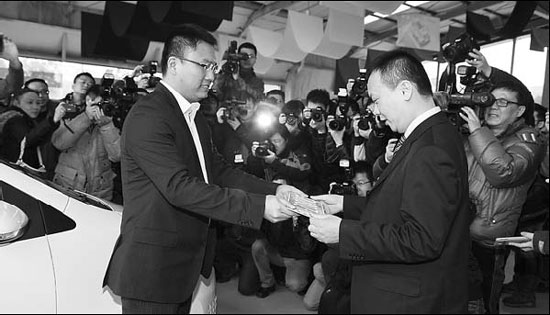SAIC delivers first battery-powered car
Updated: 2013-01-24 06:01
By He Wei in Shanghai (China Daily)
|
||||||||
|
Qian Jun (right), a 38-year-old office clerk in Shanghai, receives the license plate to his Roewe E50, the first domestically produced electric vehicle, on Wednesday. Provided to China Daily |
China's first locally manufactured, battery-powered vehicle has been handed over to its buyer in Shanghai.
Qian Jun, 38, an office clerk from the suburban district of Jiading, home to Shanghai Automotive Industry Corp, became the first owner of a Roewe E50, a purely electric supermini car developed by the company.
By opting to buy a greener vehicle, Qian benefited from a cash rebate worth 60,000 yuan ($9,648) from the central government, another 40,000 yuan courtesy of the Shanghai municipal government, and exemption from a license plate fee.
Shanghai car license plates have now hit record highs, costing around 75,000 yuan in January, equal to the price of an economy family car, making the greener option hugely appealing, even though the new-energy car plates, or EV plates, are non-transferable.
"It has been exciting since I made the order in October. I was even more thrilled to be informed later that I don't need to pay for a plate, which has become crazily expensive," Qian said on Wednesday.
According to statement from SAIC, it started developing Jiading into an electric vehicle international pilot zone in 2011.
Shanghai authorities pledged to install 1,460 vehicle-charging stations citywide by 2012, with the majority in Jiading.
Qian said when he learned about the subsidies, he felt guilty driving his previous gas-guzzling sedan to work every day, and that the incentives had put to rest any earlier concerns he had about the economic sense of buying a green vehicle.
After all the deductions, he paid about 128,000 yuan for the electric car and another 13,000 yuan for insurance and commissions.
"I've saved at least 170,000 yuan buying the car, and will spend less than 200 yuan recharging - that's almost a tenth of my monthly expenditure on gasoline," he noted.
Qian said the Roewe E50 can go as far as 180 km on a single charge, a range long enough to make five daily round trips between his home and office.
And since Qian can use a charging station in his company's parking lot, he never needs to worry about running out of fuel in the middle of nowhere.
Xu Weihan, chief financial officer of EVBuy, the designated sales, spare parts and service store for the E50 model, said the cars can also be recharged from home with an adapter that fits a standard 220V electric plug.
SAIC said 230 of the battery-powered vehicles were sold in the first week of the dual-subsidy plan taking effect, but no information on the number plate demand has been released.
Xu added that around 300 orders made last year are still waiting to be processed.
While the current national subsidy policy expired on Dec 31, 2012, Xu said he expected renewed policies to be unveiled "hopefully in February or March".
Raymond Tsang, a Shanghai-based partner at consultancy Bain & Co, said selling more than 200 electric cars in one city in one week was "impressive", but added: "If you put it into a national context, it's not as robust as it sounds".
Tsang added that the last few days of 2012, before the existing central government and municipal government subsidies lapsed, had proved a "golden week" for purchases.
Car buyers have now been given added impetus from the exemption of license fees, Tsang said, but since EV plates can neither be resold, nor reused on other internal combustion engine vehicles, they may not actually be worth the perceived value of 70,000 yuan. Tsang also said that the rebate policy really favors group purchases.
"As far as I know, if you buy more than 10 electric cars, you get an additional 2,000 yuan refund on each car. So you get more discounts if you bulk-buy."
Despite the generous financial benefits, Tsang said car customers are still wary of the lack of recharging stations, and of the distances involved in finding them, and had safety concerns regarding the batteries.
"Even if the battery technology is commercially viable, recharging is still a challenge," he added.
He said the government has allocated 5 billion yuan for the national green vehicle program, but that so far it had spent perhaps a few percent of that budget, meaning the potential still remains huge.
hewei@chinadaily.com.cn
(China Daily 01/24/2013 page16)

 In Photos: 7.0-magnitude quake hits Sichuan
In Photos: 7.0-magnitude quake hits Sichuan
 Li Na on Time cover, makes influential 100 list
Li Na on Time cover, makes influential 100 list
 FBI releases photos of 2 Boston bombings suspects
FBI releases photos of 2 Boston bombings suspects
 World's wackiest hairstyles
World's wackiest hairstyles
 Sandstorms strike Northwest China
Sandstorms strike Northwest China
 Never-seen photos of Madonna on display
Never-seen photos of Madonna on display
 H7N9 outbreak linked to waterfowl migration
H7N9 outbreak linked to waterfowl migration
 Dozens feared dead in Texas plant blast
Dozens feared dead in Texas plant blast
Most Viewed
Editor's Picks

|

|

|

|

|

|
Today's Top News
Live report: 7.0-magnitude quake hits Sichuan, heavy casualties feared
Boston suspect cornered on boat
Cross-talk artist helps to spread the word
'Green' awareness levels drop in Beijing
Palace Museum spruces up
First couple on Time's list of most influential
H7N9 flu transmission studied
Trading channels 'need to broaden'
US Weekly

|

|








